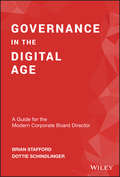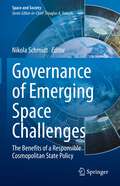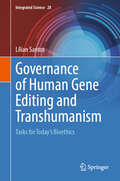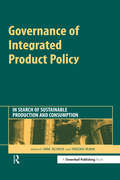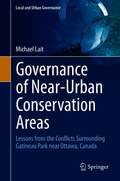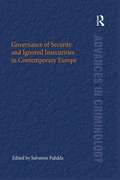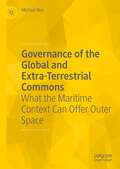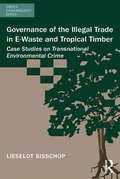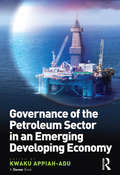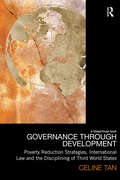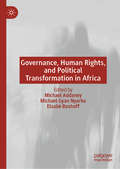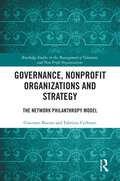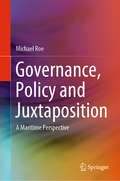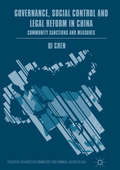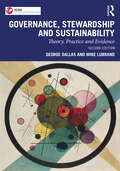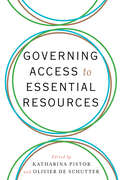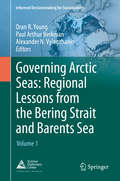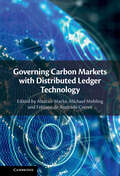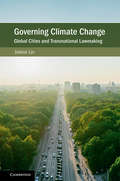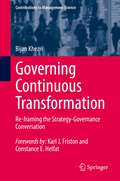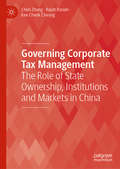- Table View
- List View
Governance in the Digital Age: A Guide for the Modern Corporate Board Director
by Brian Stafford Dottie SchindlingerA new edition of the #1 text in the human computer Interaction field! This book seeks to chart the technology-fueled changes taking place in the field of corporate governance and describes the impact these changes are having on boards and the enterprises they govern. It also describes what the future could look like once companies truly embrace the power of technology to change governance. Additionally, this book will provide a set of "suggested action steps" for companies and their boards focused on ways they can leverage technology tools to enhance governance immediately. Through a review of the latest governance research, interviews with key thought leaders, and case studies of enterprises that have embraced governance technology, readers will be armed with new insights and approaches they can take to enhance the work of their boards and senior leaders to reach new levels of performance. Explains how to use design and evaluation techniques for developing successful interactive technologies Demonstrates, through many examples, the cognitive, social and affective issues that underpin the design of these technologies Provides thought-provoking design dilemmas and interviews with expert designers and researchers Uses a strong pedagogical format to foster understanding and enjoyment An accompanying website contains extensive additional teaching and learning material including slides for each chapter, comments on chapter activities, and a number of in-depth case studies written by researchers and designers.
Governance of Emerging Space Challenges: The Benefits of a Responsible Cosmopolitan State Policy (Space and Society)
by Nikola SchmidtThis edited volume discusses how even small nation states can make a significant difference in the future of space governance. The book is divided into three main sections covering political theory, case studies, and space technology and applications. Key topics of discussion include planetary defense, space mining, and high-power systems in space. Through these timely subjects, the book presents strategies for developing a truly global governance framework in space, based on the concept of a responsible cosmopolitan state. Authored by a multidisciplinary group of researchers from the Czech Republic, the volume will appeal to other scientific teams and policymakers looking to become pioneers of cosmopolitan space policies at a national and global level.
Governance of Human Gene Editing and Transhumanism: Tasks for Today’s Bioethics (Integrated Science #28)
by Lílian SantosAre there any commonalities between Transhumanism and the WHO framework for global governance of human genome editing? If yes, what are they and what are the implications for Bioethics? To find possible common themes, the author applied the reflective thematic analysis (RTA) method to a set of texts on Transhumanism and a set of texts on the global governance of human genome editing. The selected transhumanist texts were the three documents Humanity+, the former World Transhumanist Association, calls the &“original documents on Transhumanism&” (The Transhumanist Declaration, Transhumanist FAQ 3.0, The Transhumanist Manifesto v.4). The selected texts to represent the global governance of human genome editing were the three documents published by WHO on the topic in 2021, the only plan for the global governance of this biotechnology to date (Human genome editing: a framework for governance, Human genome editing: recommendations, Human genome editing: position paper). As a result of the application of the RTA method to the selected texts, the author presents and explains three common themes. What does this mean for our society? What are the implications of the current situation? What are the tasks for Bioethics? There are emerging questions on the human condition and new concerns to be addressed by Bioethics, such as the do-it-yourself mentality. The limitations of &“therapy vs. enhancement&” ask for serious work on a better bioethical paradigm. This book analyses the object, intentions, and circumstances of enhancement in general and recommends the principle of proportionality. The author questions the predominant values and propose a refinement to some conceptions of autonomy, protection, and equality. Finally, this book offers key elements for the bioethical evaluation of each type of human genome editing. Recognising the current situation and working on the identified tasks has become crucial for contemporary Bioethics.
Governance of Integrated Product Policy: In Search of Sustainable Production and Consumption
by Dirk Scheer Frieder RubikEuropean policy patterns are in a state of transformation. New governance models are shifting power away from states and toward the involvement of all stakeholders and the idea of shared responsibility. It's a move from command and control to push and pull. What's in this new approach for the environment? This book provides a detailed analysis of the example of integrated product policy (IPP) which aims to improve the environmental performance of products and services through their life-cycle. All products cause environmental degradation in some way, whether from their manufacturing, use or disposal. The life-cycle of a product is often long and complicated. It covers all the areas from the extraction of natural resources, through their design, manufacture, assembly, marketing, distribution, sale and use to their eventual disposal as waste. At the same time it also involves many different actors such as designers, manufacturers, marketers, retailers and consumers. IPP attempts to systematically stimulate each phase of this complicated chain to improve its environmental performance. With the involvement of so many different products and actors there cannot be one simple policy measure for everything. Instead, IPP employs a whole variety of tools – both voluntary and mandatory – which are used to achieve identified objectives. These include economic instruments, the phase-out of dangerous materials, voluntary agreements, eco-labelling and product design guidelines. IPP is still in relative infancy and can be seen as an ongoing process hugely dependent on effective governance measures to ensure its continued success. This book presents a plethora of perspectives from policy-makers, researchers and consultancies, representatives from business, environmental and consumer associations on how to effectively conceptualise, institutionalise and implement IPP. The book is divided into four parts. First, the approach to the governance of IPP is examined in relation to other approaches to sustainable production and consumption. Second, the widely differing approaches to environmental product policy in practice at national, supranational and global level are analysed. Third, the book explores the challenge of designing a coherent policy mix to support the integration of sustainable consumption and production patterns by sector and theme. Finally, the book concentrates on the key issue of how to involve stakeholders in IPP in order to encourage continuous innovations for sustainability throughout the value chain. Governance of Integrated Product Policy aims to fill a clear gap in work to date on sustainable production and consumption by providing researchers and practitioners from politics, business and civil society new insights into modern environmental governance in practice.
Governance of Near-Urban Conservation Areas: Lessons from the Conflicts Surrounding Gatineau Park near Ottawa, Canada (Local and Urban Governance)
by Michael LaitThis book comprehensively describes the history of Gatineau Park, from the first proposals for a “national park” in the early 1900s to the governance issues in the present period, and it highlights the issues concerning the planning and governance of this unique near-urban ecological area. The 34,500-hectare Gatineau Park is an ecologically diverse wilderness area near the cities of Ottawa (Canada’s national capital) and Gatineau. Gatineau Park is planned and managed as the “Capital’s Conservation Park” by the federal government, specifically the National Capital Commission (NCC). This monograph examines numerous governmental and non-governmental actors that are engaged in the governance of a near-urban wilderness area. Unlike Canada’s national parks, Gatineau Park’s administration involves all three levels of government (federal, provincial, and four municipalities). This book is the first to document the relations among the public and private entities, and is one of only a handful of studies concerning the governance of Canada’s National Capital Region (NCR), which is relatively unique in the literature on federal capitals. Of particular interest to students of governance will be the examination of federal-provincial relations, as the Governments of Canada and Quebec have had a notoriously strained relationship. As the first governance study of Gatineau Park, the monograph will provide readers with insight into the significance of non-state actors, showing the range of competencies that public and private groups deploy in their negotiations with NCC planners, policymakers, park managers, local and federal politicians.
Governance of Security and Ignored Insecurities in Contemporary Europe (New Advances in Crime and Social Harm)
by Salvatore PaliddaThis book explores changes in security governance in Europe from the 1990s, focusing on some of the most important consequences: the proliferation of ignored insecurities, including the increase of oncological diseases, environmental disasters, shadow economies reproducing neo-slavery and fiscal fraud, and the general damage to the res publica. What is the articulation of removal, reclamation and consequently the implementation of devices and the establishing of prevention practices? Why are the majority of victims and also the control agency professionals seemingly resigned to these ignored insecurities? Following more than 20 years of research in the area, the authors examine these questions and how the securitisation of society has been exacerbated. They argue that the primary cause of the increase in ignored insecurities is the consequence of the neoliberal turn in security governance. This book proposes an innovative approach to security governance, not only through a serious analysis of the balance of the costs and benefits, but also highlighting what is here termed `ignored insecurities'. The authors propose a review of the problems, showing that the governance of security is a crucial element of the contemporary political organisation of society. The book ends with an innovative reflection on the Anthropocene debate and the COP21 summit which took place in Paris in December 2015.
Governance of the Global and Extra-Terrestrial Commons: What the Maritime Context Can Offer Outer Space
by Michael RoeThis book provides a unique analysis of the complex relationship between governance and the global commons. It has a specific reference to the dynamic and growing outer space economy and society, and how experience in the maritime sector (which exhibits many of the same issues and challenges as outer space) can be useful in suggesting moves forward in policy-making and design. This book fills a large gap in the literature of both governance and the development of outer space. Whilst the maritime sector has a long history of debate, albeit little in terms of governance and policy-making, outer space has much less and what there has been, commonly focused upon technical considerations. The importance of this book is that the failures of maritime governance need to be avoided in the outer space sector which exhibits many of the same issues particularly those related to the global commons. Innovative and exciting, this book will be of interest to academics studying corporate governance, business management, and space capitalism.
Governance of the IMF An Evaluation
by International Monetary FundA report from the International Monetary Fund.
Governance of the Illegal Trade in E-Waste and Tropical Timber: Case Studies on Transnational Environmental Crime (Green Criminology)
by Lieselot BisschopThis book responds to the call for more research on transnational environmental crime and its governance by investigating the illegal trade in electronic waste (e-waste) and tropical timber, major forms of transnational environmental crime. The book is based on a qualitative multi-method research combining document analysis, interviews with key informants and field visits. Bisschop focuses on the flows that pass through the research setting of the Port of Antwerp (Belgium) and those between Europe and West and Central Africa. The study examines the emergence and social organization of these transnational environmental flows, illustrating that although profit or lure play a very important role, a range of factors on individual, organizational and societal levels together provide the motivations and opportunities. Building on these insights, the book addresses the governance of these two cases. The responsive regulatory pyramid and networked governance are used as theoretical frameworks for this analysis. This book is essential reading for scholars and academics interested in transnational environmental crime and corporate crime, as well as governance studies.
Governance of the Petroleum Sector in an Emerging Developing Economy
by Kwaku Appiah-AduOil exploration in the developing world has been and continues to be a high profile and high risk activity attracting media coverage and stimulating much debate. In Governance of the Petroleum Sector in an Emerging Developing Economy, Professor Kwaku Appiah-Adu has assembled an edited volume that provides insight into critical aspects of this highly sensitive activity. Professor Appiah-Adu’s starting point is Ghana, where he has been closely involved in national policy-making. The book makes comparisons between that African country and others as diverse as Trinidad and Tobago, and Norway. The contributors, global experts in their respective fields, explore five critical themes and propose strategies for progress in each. You will find an in-depth analysis relating to: turning oil and gas wealth into sustainable and equitable development; entrenching transparency and stakeholder engagement; effective management of the oil and gas sector; and safeguarding security and the environment. Finally, country specific models and lessons, particularly for Ghana and other African oil producing nations, are offered. This book serves as reference for business practitioners, policy makers, scholars, students and anyone interested in gaining insight into the oil and gas sector, particularly as it pertains to Ghana and other African petroleum producing nations, with lessons drawn from the global arena and international best practice.
Governance through Development: Poverty Reduction Strategies, International Law and the Disciplining of Third World States (Law, Development and Globalization)
by Celine TanGovernance through Development locates the Poverty Reduction Strategy Paper (PRSP) framework within the broader context of international law and global governance, exploring its impact on third world state engagement with the global political economy and the international regulatory norms and institutions which support it. The PRSP framework has replaced the controversial structural adjustment programmes, as the primary mechanism through which official development financing is channelled to low-income developing countries. It has changed the regulatory landscape of international development financing, signalling a wider paradigmatic shift in the cartography of aid and, consequently, in the nature of north-south relations. Governance through Development documents and analyses this change within the legacy of postcolonial economic relations, revealing the wider legal, economic and geo-political significance of the PRSP framework. Celine Tan argues that the PRSP framework establishes a new regulatory regime that builds upon the disciplinary project of structural adjustment by embedding neoliberal economic conditionalities within a regime of domestic governance and public policy reform. The book will be of interest to scholars, researchers and students of law, political science and international relations, sociology and development studies.
Governance, Human Rights, and Political Transformation in Africa
by Michael Addaney Michael Gyan Nyarko Elsabé BoshoffThis edited volume examines the development and challenges of governance, democracy, and human rights in Africa. It analyzes the emerging challenges for strengthening good governance in the region and explores issues related to civil, political, economic, cultural, and social rights highlighting group rights including women, girls, and other minority groups. The project presents a useful study of the democratization processes and normative developments in Africa exploring challenges in the form of corruption, conflict, political violence, and their subsequent impact on populations. The contributors appraise the implementation gap between law and practice and the need for institutional reform to build strong and robust mechanisms at the domestic, regional, and international levels.
Governance, Nonprofit Organizations and Strategy: The Network Philanthropy Model (Routledge Studies in the Management of Voluntary and Non-Profit Organizations)
by Giacomo Boesso Fabrizio CerbioniGrant-making foundations play a crucial role in financing a wide range of philanthropic projects that contribute to the social and economic development of targeted communities. In fulfilling this essential function, the trustees who serve on each foundation's board of directors must ensure not only the economic and financial stability of their organization but also a balance with the expectations of the diverse social actors operating in the community, including associations, cooperatives, and operational foundations. This book identifies the features of the planning, programming, and controlling model of foundations that better facilitate a positive mediation between a strategic approach and civic dimensions. It offers insights and practical recommendations for designing governance and control mechanisms that promote transparency, accountability, and a network approach in the grant-making process and underscores the significance of a suitable governance framework in fostering trust and mutual understanding between foundations and their stakeholders. The guidance provided in this volume is based on rigorous research and real-world experiences, making it relevant and applicable to scholars and practitioners in the field. It serves as a valuable resource for those seeking to enhance the governance mechanisms within nonprofit organizations to maximize the impact of their philanthropic initiatives.
Governance, Policy and Juxtaposition: A Maritime Perspective
by Michael RoeThis book considers governance and policy-making within the maritime sector, and focuses significantly on the dimensional context within which governance works. Recognising the importance of understanding governance and policy at times when the world is faced with social, political, and economic problems, it highlights the fact that both areas are equally significant in understanding today’s political economy. By focusing on the maritime sector, a pillar industry supporting international trade activities, the book offers a unique perspective to explain the difficulties of balancing policy-making with governance in order to provide solutions. It also examines the importance of developing a governance process that encourages and accommodates juxtaposition in a way that ensures that the effect of independent policy-making is understood upon the success or otherwise of policies across a range of contexts and problems.Given the in-depth nature of the text, it is of interest to academics, researchers and professionals in the field.
Governance, Regulations and Powers on the Internet
by Eric Brousseau Meryem Marzouki Cécile Méadel"Digital technologies have prompted the emergence of new modes of regulation and governance, since they allow for more decentralized processes of elaboration and implementation of norms. Moreover, the Internet has been raising a wide set of governance issues since it affects many domains, such as individual rights, public liberties, property rights, economic competition, market regulation, conflict management, security and the sovereignty of states. There is therefore a need to understand how technical, political, economic and social norms are articulated, as well as to understand who the main actors of this process of transformation are, how they interact and how these changes may influence international rulings. This book brings together an international team of scholars to explain and analyse how collective regulations evolve in the broader context of the development of post-modern societies, globalization, the reshaping of international relations and the profound transformations of nation-states"--
Governance, Social Control and Legal Reform in China: Community Sanctions And Measures (Palgrave Advances in Criminology and Criminal Justice in Asia)
by Qi ChenThis book outlines how community sentences and early release options are administered in China. Chen provides empirical insights into the emerging community sector of the Chinese penal system, and illustrates how Chinese criminal courts decide between imprisonment and community sentences. Drawing on interviews with government and non-governmental supervisors, this methodological and rigorous study offers an in-depth discussion of the enforcement of these community sanctions and measures (CSM). By using the CSM reform as an example, this book illustrates the adaptation of Chinese governance and social control. Ultimately, Chen argues that the current model of governance in China (disciplinary governance) cannot guarantee an effective state-agent relationship; it also denies local governments sufficient legitimacy to secure social stability. Finally, proposing that only the rule of law and an active judiciary can complement these two deficiencies, this book will be of great interest to scholars of criminology, law, and penology, as well as anyone who is interested in how China is held together in a socio-legal sense.
Governance, Stewardship and Sustainability: Theory, Practice and Evidence
by George Dallas Mike LubranoThe first introductory practical guide of its kind, this book brings together principles of corporate governance, investor stewardship and enterprise sustainability in the context of institutional investment. Stewardship codes are developing in diverse markets to provide a framework for responsible institutional investment practices and fiduciary duties for beneficiaries. While codes provide a starting point, the application of stewardship in practical terms can be challenging for many institutional investors. Written by two well-known corporate governance experts, George Dallas and Mike Lubrano, and based on the ICGN training course on stewardship that they developed, this book gives needed clarity, rigor and guidance to practitioners about what we know—and don't know—about stewardship, governance and sustainability. It explores the theoretical foundations of stewardship, linking these to day-to-day decision-making and providing real-life examples and practical tools to evaluate issues that arise for companies from an environmental, social and governance perspective and generate ideas about how to make investor stewardship a practical reality in similar cases. Investor stewardship and ESG professionals, portfolio managers, senior managers, regulators and finance students will appreciate this unique guide to developing, refining and operationalising investor stewardship capabilities in line with the respected and internationally recognised ICGN policy framework.
Governing Access to Essential Resources
by Olivier Katharina Pistor De SchutterEssential resources do more than satisfy people's needs. They ensure a dignified existence. Since the competition for essential resources, particularly fresh water and arable land, is increasing and standard legal institutions, such as property rights and national border controls, are strangling access to resources for some while delivering prosperity to others, many are searching for ways to ensure their fair distribution.This book argues that the division of essential resources ought to be governed by a combination of Voice and Reflexivity. Voice is the ability of social groups to choose the rules by which they are governed. Reflexivity is the opportunity to question one's own preferences in light of competing claims and to accommodate them in a collective learning process. Having investigated the allocation of essential resources in places as varied as Cambodia, China, India, Kenya, Laos, Morocco, Nepal, the arid American West, and peri-urban areas in West Africa, the contributors to this volume largely concur with the viability of this policy and normative framework. Drawing on their expertise in law, environmental studies, anthropology, history, political science, and economics, they weigh the potential of Voice and Reflexivity against such alternatives as pricing mechanisms, property rights, common resource management, political might, or brute force.
Governing Access to Essential Resources
by Olivier De Schutter Katharina PistorEssential resources do more than satisfy people's needs. They ensure a dignified existence. Since the competition for essential resources, particularly fresh water and arable land, is increasing, and standard legal institutions, such as property rights and national border controls, are strangling access to resources for some while delivering prosperity to others, many are searching for ways to ensure their fair distribution. This book argues that essential resources ought to be governed by a combination of Voice and Reflexivity. Voice is the ability of social groups to choose the rules by which they are governed. Reflexivity is the opportunity to question one's own preferences in light of competing claims and to accommodate them in a collective learning process. Having investigated the allocation of essential resources in places as varied as Cambodia, China, India, Kenya, Laos, Morocco, Nepal, the arid American West, and peri-urban areas in West Africa, the contributors to this volume largely concur with the viability of this policy and normative framework. Drawing on their expertise in law, environmental studies, anthropology, history, political science, and economics, they weigh the potential of Voice and Reflexivity against such alternatives as the pricing mechanism, property rights, common resource management, political might, or brute force.
Governing Arctic Seas: Volume 1 (Informed Decisionmaking for Sustainability)
by Oran R. Young Paul Arthur Berkman Alexander N. VylegzhaninGoverning Arctic Seas introduces the concept of ecopolitical regions, using in-depth analyses of the Bering Strait and Barents Sea Regions to demonstrate how integrating the natural sciences, social sciences and Indigenous knowledge can reveal patterns, trends and processes as the basis for informed decisionmaking. This book draws on international, interdisciplinary and inclusive (holistic) perspectives to analyze governance mechanisms, built infrastructure and their coupling to achieve sustainability in biophysical regions subject to shared authority. Governing Arctic Seas is the first volume in a series of books on Informed Decisionmaking for Sustainability that apply, train and refine science diplomacy to address transboundary issues at scales ranging from local to global. For nations and peoples as well as those dealing with global concerns, this holistic process operates across a ‘continuum of urgencies’ from security time scales (mitigating risks of political, economic and cultural instabilities that are immediate) to sustainability time scales (balancing economic prosperity, environmental protection and societal well-being across generations). Informed decisionmaking is the apex goal, starting with questions that generate data as stages of research, integrating decisionmaking institutions to employ evidence to reveal options (without advocacy) that contribute to informed decisions. The first volumes in the series focus on the Arctic, revealing legal, economic, environmental and societal lessons with accelerating knowledge co-production to achieve progress with sustainability in this globally-relevant region that is undergoing an environmental state change in the sea and on land. Across all volumes, there is triangulation to integrate research, education and leadership as well as science, technology and innovation to elaborate the theory, methods and skills of informed decisionmaking to build common interests for the benefit of all on Earth.
Governing Carbon Markets with Distributed Ledger Technology
by Alastair Marke Michael A. Mehling Correa, Fabiano de AndradeCarbon markets involve complex governance challenges, such as ensuring transparency of emissions, facilitating as well as recording transactions, overseeing market activity and preventing abuse. Conventionally, these have been addressed with a combination of regulatory, procedural and technical structures that impose significant burdens on market participants and administrators while remaining vulnerable to system shocks and illicit practices. Distributed Ledger Technology (DLT) has the potential to address these problems. This volume offers the first book-length exploration of how carbon markets can be governed using DLT, offering conceptual and theoretical analysis, practical case studies, and a roadmap for implementation of a DLT-based architecture in major existing and emerging carbon markets. It surveys existing expertise on distributed ledger technology, provides progress updates from industry professionals, and shows how this technology could offer a cost-effective and sustainable solution to double-counting and other governance concerns identified as major challenges in the implementation of carbon markets.
Governing Climate Change: Global Cities and Transnational Lawmaking (Cambridge Studies on Environment, Energy and Natural Resources Governance)
by Jolene LinCities are no longer just places to live in. They are significant actors on the global stage, and nowhere is this trend more prominent than in the world of transnational climate change governance (TCCG). Through transnational networks that form links between cities, states, international organizations, corporations, and civil society, cities are developing and implementing norms, practices, and voluntary standards across national boundaries. In introducing cities as transnational lawmakers, Jolene Lin provides an exciting new perspective on climate change law and policy, offering novel insights about the reconfiguration of the state and the nature of international lawmaking as the involvement of cities in TCCG blurs the public/private divide and the traditional strictures of 'domestic' versus 'international'. This illuminating book should be read by anyone interested in understanding how cities - in many cases, more than the countries in which they're located - are addressing the causes and consequences of climate change.
Governing Continuous Transformation: Re-framing the Strategy-Governance Conversation (Contributions to Management Science)
by Bijan KhezriThis book transposes the ‘free-energy principle’, as espoused by the neuroscientist Karl Friston, to strategic governance, and forming the new concept of Free-Energy Governance (FEG). This concept lays the foundation for a new logic of governing continuous transformation. In addition to guiding the structure, cognition, and capabilities of success in strategic renewal, FEG provides a systematic and practice-relevant approach to predicting a firm’s potential for entropy.Using this new concept, the author shows that the success of continuous strategic renewal and business innovation, elements crucial for firm survival, are determined by the triplet of a firm’s structure, cognition, and dynamic board capabilities. “How to govern large organizations in times of high uncertainty and permanent change? To answer this pressing question, … Bijan Khezri has been the first to apply [the free energy] principle to management science … This book is an eyeopener for every reflective leader.¨ Professor Oliver Gassmann, Director of the Institute of Management and Technology, University of St. Gallen “I really enjoyed reading this book. It was both exciting and reassuring to see how the same fundamental ideas can be found in fields as disparate as nonequilibrium steady-state physics and theories of governance.” Professor Karl. J. Friston; Director of the Wellcome Centre for Human Neuroimaging “Using a term often applied to best-selling novels, ‘it is a page turner’ in which I learned something new in every chapter! Every board member, all executives and scholars interested in strategic leadership and governance must read this book if they wish to remain relevant in the coming transformational decades.” Michael A. Hitt University Distinguished Professor Emeritus, Mays Business School, Texas A&M University Former President, Academy of Management, and former Editor, Academy of Management Journal "We could not ask for a better author to initiate this new conversation in the board research community and convey its merits to the world of board practice." Martin HilbProfessor Emeritus, University of St. Gallen Founder and Managing Partner, International Board Foundation and President of Swiss Institute of Directors “Set against a wide swath of literature, the book impressively makes the case for a new logic of strategic renewal in which the board of directors plays a central role.” Professor Constance E. Helfat, Tuck School of Business at Dartmouth
Governing Corporate Social Responsibility in the Apparel Industry after Rana Plaza
by Anil Hira Maureen Benson-ReaThis edited collection critically explores the efforts of the apparel industry to improve safety conditions and suggests governance reforms that will resolve lingering issues. The volume examines two consortia: the Alliance and the Accord, which set up cooperative auditing systems of supplying factories and penalties for non-compliance, and include funding to help factories comply and for workers if factories are idled during repairs, though the editors raise doubts about the long-lasting value of such efforts. In the wake of the 2013 Rana Plaza disaster, leading researchers across labor relations and industry studies tackle and debate such issues, giving their perspective of how multinationals operating in developing countries should regulate labor standards in order to resolve and improve the substandard working conditions under which much of our clothing is made.
Governing Corporate Tax Management: The Role of State Ownership, Institutions and Markets in China
by Rajah Rasiah Kee Cheok Cheong Chen ZhangThis book focuses on corporate sector development in the context of transition economies, such as China. In doing so, the book uses quantitative methods to test several hypotheses that are salient to the Chinese economic situation.Topics covered in the book include the relationship between tax management and firm performance, the extent to which a short-term focus on tax management can lead to long-term vulnerabilities, the impact of government ownership on tax management impact, and the link between the co-evolution of marketization and corruption, and institutional change and tax management.With that the book offers rich empirical evidence to examine tax management, firm performance and corruption in a broad context, while permitting comparison between the Chinese experience and the market economies.
